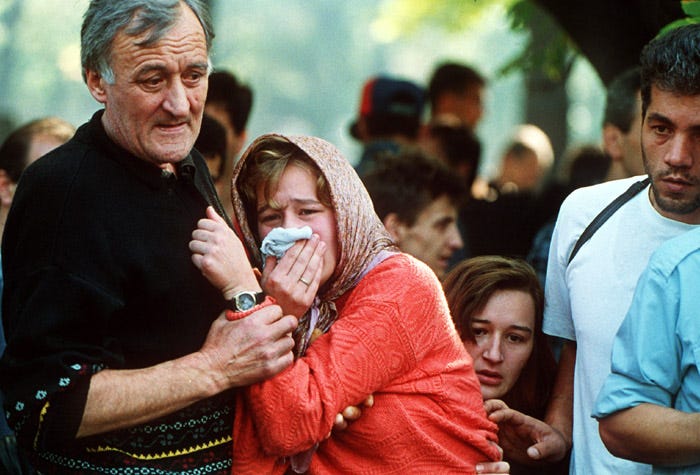Issue 16: Focus On Grief
“Grief is praise, because it is the natural way love honors what it misses.” - Martín Prechtel
This issue is about grief, and dedicated to Guy’s friend Bruno Fleurit who died on Easter Monday.
All of us have to manage loss in our lives, and the process of grief is how nature has ordained that we do it. It often starts with shock, then comes in waves of disbelief and sadness, then ripples out to touch all the areas of our lives which will be affected by the loss. This may provoke fear and desperation, but also compassion and a new sense of closeness with those around us as we recognise the fleeting quality of our impermanent existence in this world.
Jamie Wheal wrote well on dealing with grief in his excellent book Recapture The Rapture:
“Nearly one in ten of us will be diagnosed with post-traumatic stress disorder in our lifetimes. The rest of us suffer micro-PTSD nearly all the time. Having a way to digest our grief, rather than choke on it, becomes essential. As Bessel van der Kolk writes, our bodies really do keep the score. Our nervous systems accumulate stressors until we’re fibrillating messes. Once we’re in a hijacked state, we are less perceptive, resilient, and resourceful. We are then more likely to stumble and make things worse. Hurt people, the old joke goes, hurt people. It would be funnier if it weren’t so true.
“Whether it’s the absolution of Catholic confession, the ritual forgiveness of Jewish Yom Kippur, or the cathartic suffering of a Lakota Sun Dance ceremony, religion has always provided ways for us to mend and atone. Reset the Etch A Sketch. There’s too much tragedy in the human experience to process it all unaided. Without some way to wipe the slate clean, our lives become mired. When we have cultural processes that hold us up while we suffer, we can transform that suffering into something profound. “Grief is praise,” explains poet and Mayan elder Martin Prechtel, “because it is the natural way love honors what it misses.””
We have included a link to an excerpt from The Smell of Rain On Dust by Prechtel in this issue because it is an insightful look into the value of grief in our lives.
The other links look at grieving loved ones, but also the lengthening shadow and increasing necessity of grief for the damage being done to our beloved planet, and the worlds which are being lost by the increasing rate of change in our exponentially mutating modern chaos.
Table of Contents
Links
Brain chips: the Sydney researchers ‘miles ahead’ of Elon Musk’s Neuralink - The Guardian
Landmark study shows that ‘transcendent’ thinking may grow teens’ brains over time
AI Finds Personality Shapes Genes - Neuroscience News
Jonathan Haidt’s New Book Confronts Gen Z Anxiety - Mind Matters
Building Intelligent Machines Helps Us Learn How Our Brain Works
Debunking the Hype of Artificial General Intelligence - Mind Matters
Focus On Grief
Grief is Praise, by Martin Prechtel | DailyGood
How to Grieve Our Changing Planet | Scientific American
Public Grief and Parkland – SAPIENS
Afterlife Conversations: Healing Power in Grief's Journey? - Neuroscience News
Embracing The Sadness Of Grief | Carl Jung
Grandpa Wim and the Transmutation of Grief – Rune Soup
Gabor Maté on Understanding Grief as an Antidote to Trauma
5 stages of grief is a myth. It never ends - Big Think
Addressing Atrocity - Matt Kahn
Nuggets From The Archive
The Neuroscience of Musical Tastes
Solving the Hard Problem of Consciousness
Bigelow Essays
“Overwhelming Evidence For Life After Death”
Events
David Luke on LinkedIn: We are looking for London based people during March and April to volunteer a couple…
In-person volunteers needed in Greenwich, London, UK, to validate some data for a study on psychedelics and exceptional human experience.
Tickets – The Festival of Consciousness
July 12th-14th 2024, Barcelona, Spain
Large volunteer-organized in-person conference featuring more than 100 talks and experiences over three days.
Breaking Convention is back!
Psychedelic Culture - Chacruna
April 27th and 28th, 2024, San Francisco, CA
A two day in-person conference, with 3 simultaneous tracks.
More psychedelic conference details here
Links
Brain chips: the Sydney researchers ‘miles ahead’ of Elon Musk’s Neuralink | Neuroscience | The Guardian
Tory Shepherd discusses the advances in brain-computer interface (BCI) technology, focusing on the work of Australian researchers who are "miles ahead" of Elon Musk's Neuralink in terms of sophistication and safety. Synchron, an Australian start-up, has successfully implanted its devices in the brains of five patients, enabling them to communicate and control devices using their thoughts. In contrast, Neuralink, despite its high-profile announcements, has yet to receive FDA approval and is facing concerns about brain privacy and hacking risks. She also highlights the importance of ethical considerations and careful language in neurotechnology research to prevent harm to patients and their families.
Landmark study shows that ‘transcendent’ thinking may grow teens’ brains over time
This study, conducted by scientists at the University of Southern California Rossier School of Education’s Center for Affective Neuroscience, Development, Learning and Education (CANDLE) reveals that engaging in "transcendent" thinking, which involves analyzing situations for deeper meaning and broader implications, may lead to the growth of teenagers' brains over time. This type of thinking goes beyond reacting to social situations and involves considering ethical, systems-level, and personal aspects. The research suggests that teens who engage in transcendent thinking show increased coordination between brain networks over two years, regardless of IQ or socioeconomic status, highlighting the potential impact of this cognitive approach on brain development.
AI Finds Personality Shapes Genes - Neuroscience News
An international study, led by the University of Granada in Spain, and using artificial intelligence, reveals that our personalities can influence gene expression, shedding light on the intricate interaction between the mind and body. Researchers identified a network of 4,000 genes that adjust their expression based on individuals' personality traits, impacting health and well-being. The study uncovered a control hub of six evolutionarily preserved genes (even present in single-celled organisms) that coordinate emotional and meaningful processing, suggesting that fostering a self-transcendent, creative outlook on life may enhance well-being and health by regulating gene expression.
Spontaneous Spiritual Awakenings: Phenomenology, Altered States, Individual Differences, and Well-Being
This study by Jessica Sophie Corneille and David Luke explores spontaneous spiritual awakenings, focusing on altered states of consciousness (ASCs) and their impact on individuals' well-being. It delves into the profound psychological shifts experienced during these awakenings, which can lead to lasting changes in self-perception and worldview. Personality traits like absorption play a role in predisposing individuals to ASCs, with measures indicating a strong connection to mystical experiences. Trauma does not seem to be a barrier to these experiences; on the contrary.
Jonathan Haidt’s New Book Confronts Gen Z Anxiety | Mind Matters
This is a review of Jonathan Haidt's new book, "The Anxious Generation," which delves into the anxiety epidemic among young adults in the West, particularly those born after 1995. Haidt attributes the rise in anxiety and depression to the transition from a play-based childhood to a phone-based one, citing social anxiety, sleep deprivation, attention fragmentation, and addiction as consequences.
Building Intelligent Machines Helps Us Learn How Our Brain Works
George Musser discusses the quest for artificial general intelligence (AGI), a hoped-for outgrowth of AI but with human-like adaptability and creativity, and the lessons learned about our own intelligence during this pursuit. Large language models have acquired more problem-solving ability than expected, but they still make silly mistakes and lack open-ended learning capabilities. AI systems excel in language processing but fail at other aspects of thinking. The search for AGI has provided valuable insights into our own intelligence, highlighting the importance of experience and quick problem-solving in survival.
Debunking the Hype of Artificial General Intelligence | Mind Matters
In this podcast, host Michael Egnor interviews Dr. William Dembski, a senior fellow at Discovery Institute’s Center for Science and Culture, discussing Dembski's essay "Artificial General Intelligence as an Idol for Destruction." Dembski argues against the belief in the imminent arrival of AGI, asserting that AI lacks the universality and ingenuity of human intelligence and expressing concerns about the potential negative effects on society, such as the loss of humanity and the risks of mimetic contagion. He advocates for a tool-based perspective on AI, emphasizing its utility rather than positioning it as a replacement for human intelligence.
The new science of death: ‘There’s something happening in the brain that makes no sense’ | Death and dying | The Guardian
Alex Blasdel discusses recent research on near-death experiences and its implications for our understanding of consciousness and death. As one might expect from The Guardian he does steer clear of endorsing the idea that consciousness might survive death in some form, but the article is fascinating on the physical process of death and its implications, and Blasdel does touch on the idea that near-death experiences may be evidence of a non-local force that pervades the universe and is received by the brain, rather than being generated by it.

Focus On Grief

Grief is Praise, by Martin Prechtel | DailyGood
An excerpt from Prechtel’s excellent book on grief, The Smell of Rain On Dust. “Grief is praise, because it is the natural way love honors what it misses.”
How to Grieve Our Changing Planet | Scientific American
Megan Mayhew-Berman discusses Lydia Millet's book, "We Loved It All: A Memory of Life," which delves into the profound grief and loss associated with humanity's impact on the environment. Millet's narrative skillfully intertwines personal stories, ecology, and history, portraying a poignant reflection on the interconnectedness of existence and the devastation caused by human actions on the planet. Through a philosophical and eulogistic tone, the book mourns the loss of a once pristine world while urging readers to remember and honor the intricate web of life that has been disrupted, emphasizing the need for respect and awareness of our ecological interconnectedness.
Public Grief and Parkland – SAPIENS
Richard Wilshusen from Sapiens explores the role of public grief in society, emphasizing the importance of acknowledging and addressing the complex emotions that arise from mass trauma and public tragedy. Drawing on the aftermath of the Parkland school shooting, the article highlights the need for sustained coverage and understanding of the grieving process, which involves disorganization, confusion, eventual acceptance, and rediscovery of meaning in life. Wilshusen argues that grief is not confined to individuals but plays a fundamental role in society, and that the failure to recognize the right to mourn compounds losses.
Claire | The Documentary
This is a beautiful and inspiring documentary about Claire Wineland, a girl born with cystic fibrosis who knows she will have a relatively short life (spoiler: she died aged 21 after a lung transplant). This has given her a perspective wise well beyond her years. Plus she is irreverent and funny, so the film is moving without being depressing.
Afterlife Conversations: Healing Power in Grief's Journey? - Neuroscience News
This is about a study by the University of Virginia on the phenomenon of After-Death Communications (ADCs) and their impact on individuals grieving the loss of a partner. Findings indicate that a significant percentage of people experience ADCs, with many reporting therapeutic benefits, including easing the acceptance of their loss. The study underscores the potential positive role of ADCs in the bereavement process, highlighting their influence on grief-related sadness and acceptance of the loss, suggesting a therapeutic aspect to these interactions.
Embracing The Sadness Of Grief | Carl Jung
“Neurosis is always a substitute for legitimate suffering”. This video is about Carl Jung’s view on grief and how he underscores the significance of embracing it as a universal experience that fosters personal growth and wisdom, emphasizing its evolutionary importance for mammals, including humans. Unresolved grief can lead to mental illness, highlighting the need for proper grieving, which includes giving oneself time and space to heal from loss. Seeking professional help for unresolved grief is a valid and important step in the healing process, ultimately opening individuals to life and allowing for clearer perception.
Grandpa Wim and the Transmutation of Grief – Rune Soup
Rune Soup discusses the story of Wim Hof, a - now pretty well-known - man who developed his famous breathing technique after jumping into an icy pond in Amsterdam to cope with the grief of losing his wife. The technique has been used in client sessions to heal autonomic dysregulation with some success.
Gabor Maté on Understanding Grief as an Antidote to Trauma
“Genuine grief is the opposite of trauma” - Dr. Maté talks about the differences and relationship between grief and trauma in this short video, explaining that genuine grief is the opposite of trauma. Trauma is a resistance to grief, and coming to terms with loss through grieving is the antidote to trauma. Maté emphasizes that trauma is not the same as suffering, pain, or fear, but rather getting stuck in the impact of events. He stresses the importance of responding actively with agency to prevent trauma, and suggests that cultivating our own capacity to choose is key to supporting others.
5 stages of grief is a myth. It never ends - Big Think
Magda Romanska challenges the traditional notion of grief as a linear journey with five stages, emphasizing that grief does not follow a predetermined progression. Psychologists Jason Holland and Robert Neimeyer argue that the five-stage model persists due to cultural influences, highlighting that in many traditional cultures, the dead remain connected to the living, offering a different perspective on closure and recovery. Grief is portrayed as a complex trauma that can lead to profound disruptions, including a loss of personal identity tied to relationships, particularly when losing a spouse or child, necessitating a challenging process of self-reconstruction amidst profound confusion and emotional turmoil.
Addressing Atrocity - Matt Kahn
Matt Kahn discusses the importance of facing up to the fact of atrocities and injustices in the world, emphasizing the role of awareness and compassion in fostering change. He encourages readers to acknowledge the impact of these issues on others and to use moments of disgust as reminders to anchor blessings, promoting a global tipping point where violence and abuse cannot exist. Kahn emphasizes the importance of clear intentions and affirmative statements in anchoring positive outcomes throughout the multi-dimensional field of reality, while avoiding the extremes of denial or excessive information consumption.
Nuggets From The Archive
The Neuroscience of Musical Tastes
Jane Kuehne, Associate Professor of Music Education at Auburn University, explores the reasons behind different musical tastes, emphasizing that people's brains process music uniquely, leading to varying preferences based on personality, physical reactions, and personal connections to the music or artists. Certain songs can appeal to a wide variety of listeners due to their ability to surprise, intrigue, and entertain, while musical taste can also provide insights into an individual's personality. She highlights the importance of understanding different musical preferences and personalities in bridging gaps between people with diverse identities.
Solving the Hard Problem of Consciousness
In this video, Rupert Spira discusses the concept of consciousness with a participant in one of his seminars, and challenges the idea that it is an emergent phenomenon of the brain. By examining personal experience and questioning the lack of evidence for consciousness emerging from matter (not entirely convincingly, but see for yourself if you agree), he highlights the importance of basing theories on the evidence of experience, leading the questioner into direct contact with formless awareness, and away from theory.
Bigelow Essays
Long Concealed, Now Revealed: Overwhelming Evidence for Life after Death
"Evidence of Life After Death" by Michael Tymn presents a comprehensive review of the evidence supporting the existence of life after death. He examines a range of phenomena, including near-death experiences (NDEs), mediumship, and reincarnation, as well as the scientific evidence for consciousness existing beyond the physical body. His argument is that the preponderance of evidence supports the hypothesis that consciousness can survive bodily death, and that this has significant implications for our understanding of the nature of reality and the human condition.
Tymn provides detailed accounts of NDEs, including those that involve out-of-body experiences, encounters with deceased loved ones, and life reviews. He goes on to examine the scientific evidence for NDEs, including studies that suggest NDEs are associated with changes in brain chemistry and electrical activity. He then turns to mediumship, discussing the results of various experimental studies that suggest mediums can provide accurate and specific information about deceased individuals. He explores the concept of reincarnation, presenting evidence from cases of children who claim to remember past lives, as well as from studies of near-death experiences that suggest a continuity of consciousness beyond death. Tymn’s conclusion is that the evidence for life after death is compelling and warrants further scientific investigation.















Grief is obviously a natural response to the death of a loved one either human or non-human.
But up to and after a point which obviously differs for everyone grief becomes a dramatization of "poor me". Because you are no longer here I cant be either happy (without you) and essentially refuse to be responsible for my intrinsic capacity to be a loving presence here.